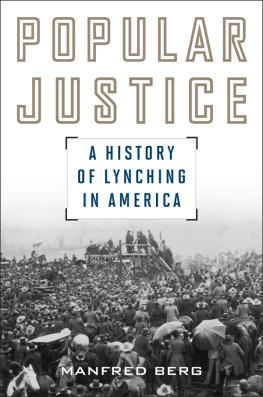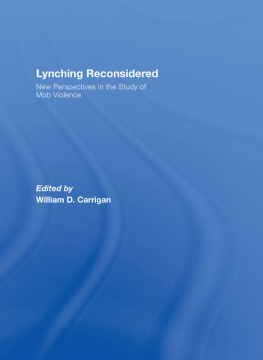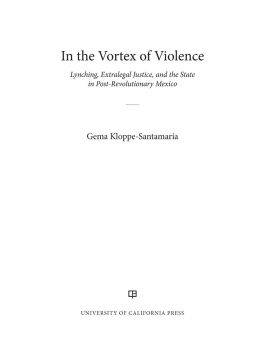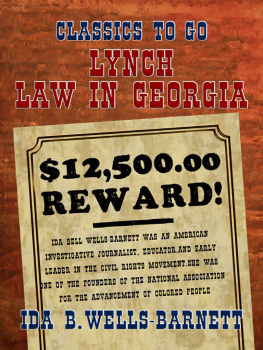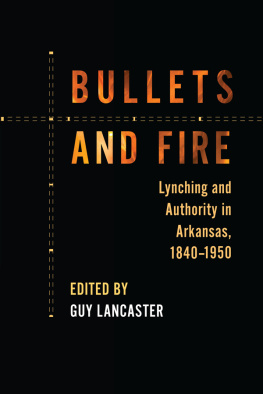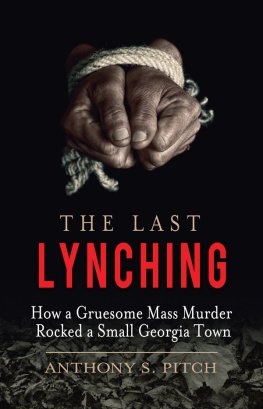IVAN R. DEE Chicago
POPULAR JUSTICE. Copyright 2011 by Manfred Berg. All rights reserved, including the right to reproduce this book or portions thereof in any form. For information, address: Ivan R. Dee, Publisher, 4501 Forbes Boulevard, Lanham, Maryland 20706 , a member of the Rowman & Littlefield Publishing Group. Manufactured in the United States of America and printed on acid-free paper.
Popular justice : a history of lynching in America / Manfred Berg.
p. cm (American ways series)
ISBN 978-1-56663-802-9 (cloth : alk. paper) ISBN 978-1-56663-920-0 (electronic)
. LynchingUnited StatesHistory. I. Title.
Preface
in 1905 the sociologist James E. Cutler introduced his book Lynch-Law: An Investigation into the History of Lynching in the United States with these words:
It has been said that our countrys national crime is lynching.... The practice whereby mobs capture individuals suspected of crime... , and execute them without any process of law... , is to be found in no other country of a high degree of civilization. Riots and mob executions take place in other countries, but there is no such frequent administration of what may be termed popular justice which can properly be compared with lynch-law procedures in the United States.
Although Cutlers study is outdated in many respects, its characterization of lynching as popular justice may yet be considered the best starting point to define the subject of this book. While anti-lynching activists and historians have endlessly argued over the proper definition of lynching, it is indisputable that since the term originated during the American Revolution it has referred to extralegal punishment meted out by a group of people claiming to represent the will of the larger community and acting with an expectation of impunity. Until the mid-nineteenth century, lynching or lynch law did not necessarily mean that mobs killed their victims. The terms also included nonlethal forms of communal punishment such as flogging or tarring and feathering. Whether deadly or not, lynching typically entailed a strong element of ritual aimed at reinforcing a sense of community among the executioners of popular justice. Hence some scholars have compared lynchings to rituals of human sacrifice designed to symbolically restore a disrupted world.
Lynching as an act of communal punishment must be distinguished from hate crimes on the one hand and riots on the other. Hate crimes are random acts of violence against racial, ethnic, religious, and sexual minorities without the pretext of punishing a particular crime and, at least in recent years, without community approval. Riots involve large-scale collective violence in which the participants make no claim to be agents of justice. To be sure, it is often difficult to draw clear lines between hate crimes, riots, and lynchings.
To speak of lynching as extralegal punishment takes for granted the principle that only government institutions have the authority to enforce the law, suppress crime, and punish criminals. In short, the word lynching assumes the existence of the modern state which, theoretically, holds a monopoly of legitimate violence. In historical terms this is a fairly recent idea. Throughout most of human history the punishment of crime has been a matter of retribution by the wronged victims and their kinfolk. In Europe blood feuds persisted into the late Middle Ages, and it was generally accepted that a legitimate way to avenge a slain family member was to kill the slayer or members of his family. While blood vengeance may appear barbaric in modern eyes, it nevertheless provided a basic sense of protection in an age without a centralized power to ensure a general peace. Moreover the advance of formal law was slow and uneven. Among the rural populations of Europe, traditions of communal justice continued into the late nineteenth century. In American history the practice of lynching has often been attributed to conditions on the frontier, where the people were supposedly forced to take the law into their own hands because no effective system of law enforcement and criminal justice existed.
But it is misleading to see lynching primarily as communal self-help that ceased as soon as the state had successfully secured a monopoly of legitimate violence. On the contrary, American lynchers in the late nineteenth and early twentieth centuries, as the historian Michael Pfeifer has argued, were reacting to the establishment of a modern criminal justice system that attempted to replace the communitys desire for rough justice with an abstract, rational, detached, antiseptic legal process. Opponents condemned lynching as lawlessness, but its apologists justified it as an instrument of a higher law that heeded the values, traditions, and vital interests of the community. In order to dramatize their claim to meting out true popular justice, lynchers often staged ritualistic mock trials aimed at creating a semblance of law and order administered by a righteous community.
Mob violence can be found in most societies, but James Cutler, writing in the early twentieth century, surely had a point that the frequency and cruelty of lynchings singled out the United States among the so-called civilized nations of the time. What accounts for this negative exceptionalism? Why were Americans such a lynch-prone people, especially during the nineteenth and early twentieth centuries? In trying to answer these questions, historians have usually considered three core themes that will also be central to this book: the frontier experience, the race conflict, and the anti-authoritarian spirit of grassroots democracy.
The lawlessness of the frontier is the classic apology for vigilantism and lynching. The folkloristic image of hardened pioneers making short work of brazen outlaws has left a deep mark on American popular culture and greatly contributed to a highly ambivalent attitude toward mob violence. The significance of racism is equally evident, given that during the age of Jim Crow the vast majority of lynch victims were African Americans. White supremacists defended lynching as necessary to protect the purity of the white race against the allegedly insatiable drive of black men to rape white women. In contrast, readers may find it more difficult to accept that the spirit of grassroots democracy also was a wellspring of lynching in American history. Yet in claiming to execute the will of the people, the executioners of popular justice asserted their own ideas of democratic participation and local self-government. In a democracy, James Cutler aptly noted, the people consider themselves a law unto themselves.... To execute a criminal deserving of death is to act merely in their sovereign capacity.
The late Charles Tilly, a leading student of collective violence, once confessed that he preferred a rough-and-tumble democracy over a nonviolent tyranny. But this is a false alternative. This book is predicated on the premise that liberal democracy has provided a solution to the problem of balancing order and liberty, namely the state monopoly of legitimate violence controlled by the rule of law, an independent judiciary, and the democratic process. Wherever this system works reasonably well, there is no need for law enforcement by private individuals and extralegal communal justice. American legal culture, in this regard, has been shaped by a striking contrast. While there has always been a strong tradition of popular justice and private violence, Americans have been rightly proud of their contributions to implementing a government of laws, and not of men, as John Adams famously phrased it in the Massachusetts Constitution of 1780 . Ordered liberty and the rule of law require the prudent self-restraint of the people, especially in the realm of criminal justice. It is no coincidence that the Constitution twice, in the Fifth and the Fourteenth amendments, mandates the fundamental principle that no person shall be deprived of life, liberty, or property, without due process of law, binding both the federal and the state governments. Over the course of American history, lynchers ignored this pillar of liberty. They ignored the intent of due process, which exists not to shield criminals from justice but to protect all members of society from despotism, including the despotism of the people taking the law into their own hands.

